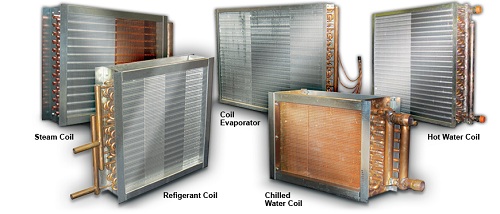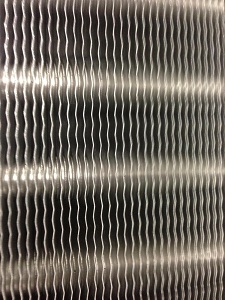
While your air conditioning unit may seem like a complex machine, cooling your home is in essence, a very simple process. An HVAC system cools the air by replacing heated air with cool air through a heat exchanger coil. This coil transfers the heat between the fluids, such as water or intermediate fluid (Freon) present in your HVAC system.
While the exchanger coils in HVAC units all perform much the same function, there are many types and virtually an infinite size range of coils at work all over the world today.
Types of Heat Exchanger Coils
• Condenser Coils
• DX or Evaporator Coils
• Cold Water Coils
• Hot Water Coils
• Steam Coils
• Booster Coils
Common Coil Problems
For air conditioning units, direct contact heat exchangers are most commonly used to transfer heat from gas (air), using liquid refrigerants or chilled water in pipes. Cross flow is a type of heat exchanger coil that is most popular in air conditioners, especially since it utilizes a very efficient cooling system, causing the blowers to force the air over coils filled with the refrigerant or chilled water.
While HVAC units generally operate smoothly, there are several maintenance issues that must be considered. Condensation, freezing temperatures, and improper (or degraded) insulation are all problems that you must protect your HVAC unit from.

Protecting Your Coils
As air is chilled, condensation is formed. This can cause rust and other problems to occur on your evaporators coils. To prevent rust in your heat exchanger coils, specialty coating can be applied to minimize damage from condensation. At American Coil, our AmeriCoat coil coating system is specifically designed to increase the durability, efficiency and lifespan of your coils.
All of these problems can be solved with a specialty coil coating. AmeriCoat blocks corrosion, maximizes operating life, and minimizes cleaning and maintenance. Additionally, it does not affect heat transference. American Coil has developed one of the best coil coatings, specially formulated to protect HVAC coils against all the dangers inherent in an HVAC system, including extreme temperatures, microorganisms, rust, and corrosion.
Enduring Extreme Climates
Another concern with heat exchange coils or sheets is that many units are installed on the exterior of buildings or in spaces like attics that don’t have extensive insulation. As a result, the units are subjected to weather extremes, from hot summer days to freezing winter nights. While air conditioners rarely run in the winter, heating systems also rely on heat exchanger coils and these these coils must be protected.

Really great post, I surely adore this website, keep on it.
Way trendy, some valid points! I appreciate you making this article available, the remaining part of the site is also high quality.
Have a enjoyable.
Way cool, some valid points! I appreciate you making this article available,
the remaining part of the website is also high quality. Have
a fun.
Great post. I’m facing a couple of these difficulties.
Awsome site! I am loving it!! Will come back again. I am taking your feeds also.
I love it when people come together and share views, great blog,
keep it up.
Great info. Lucky me I reach on your site by accident, I bookmarked it.
Greetings! Very helpful guidance on this article! It truly is the little changes that make the
biggest changes. Thanks a lot for sharing!
Hi there! This post couldn’t be written any better!
Reading through this post reminds me of my previous room mate!
He constantly kept talking about this. I ‘ll forward this post to him.
Quite sure he’ll have a good read. Thank you for sharing!
Good information. Blessed me I reach on your website by accident,
I bookmarked it.
Quite! This was a truly amazing post. Thank you for your provided information